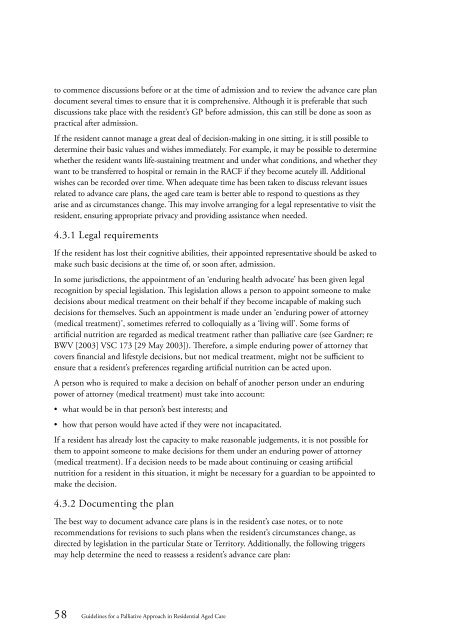Guidelines for a Palliative Approach in Residential Aged Care
Guidelines for a Palliative Approach in Residential Aged Care
Guidelines for a Palliative Approach in Residential Aged Care
You also want an ePaper? Increase the reach of your titles
YUMPU automatically turns print PDFs into web optimized ePapers that Google loves.
to commence discussions be<strong>for</strong>e or at the time of admission and to review the advance care plan<br />
document several times to ensure that it is comprehensive. Although it is preferable that such<br />
discussions take place with the resident’s GP be<strong>for</strong>e admission, this can still be done as soon as<br />
practical after admission.<br />
If the resident cannot manage a great deal of decision-mak<strong>in</strong>g <strong>in</strong> one sitt<strong>in</strong>g, it is still possible to<br />
determ<strong>in</strong>e their basic values and wishes immediately. For example, it may be possible to determ<strong>in</strong>e<br />
whether the resident wants life-susta<strong>in</strong><strong>in</strong>g treatment and under what conditions, and whether they<br />
want to be transferred to hospital or rema<strong>in</strong> <strong>in</strong> the RACF if they become acutely ill. Additional<br />
wishes can be recorded over time. When adequate time has been taken to discuss relevant issues<br />
related to advance care plans, the aged care team is better able to respond to questions as they<br />
arise and as circumstances change. This may <strong>in</strong>volve arrang<strong>in</strong>g <strong>for</strong> a legal representative to visit the<br />
resident, ensur<strong>in</strong>g appropriate privacy and provid<strong>in</strong>g assistance when needed.<br />
4.3.1 Legal requirements<br />
If the resident has lost their cognitive abilities, their appo<strong>in</strong>ted representative should be asked to<br />
make such basic decisions at the time of, or soon after, admission.<br />
In some jurisdictions, the appo<strong>in</strong>tment of an ‘endur<strong>in</strong>g health advocate’ has been given legal<br />
recognition by special legislation. This legislation allows a person to appo<strong>in</strong>t someone to make<br />
decisions about medical treatment on their behalf if they become <strong>in</strong>capable of mak<strong>in</strong>g such<br />
decisions <strong>for</strong> themselves. Such an appo<strong>in</strong>tment is made under an ‘endur<strong>in</strong>g power of attorney<br />
(medical treatment)’, sometimes referred to colloquially as a ‘liv<strong>in</strong>g will’. Some <strong>for</strong>ms of<br />
artificial nutrition are regarded as medical treatment rather than palliative care (see Gardner; re<br />
BWV [2003] VSC 173 [29 May 2003]). There<strong>for</strong>e, a simple endur<strong>in</strong>g power of attorney that<br />
covers f<strong>in</strong>ancial and lifestyle decisions, but not medical treatment, might not be sufficient to<br />
ensure that a resident’s preferences regard<strong>in</strong>g artificial nutrition can be acted upon.<br />
A person who is required to make a decision on behalf of another person under an endur<strong>in</strong>g<br />
power of attorney (medical treatment) must take <strong>in</strong>to account:<br />
• what would be <strong>in</strong> that person’s best <strong>in</strong>terests; and<br />
• how that person would have acted if they were not <strong>in</strong>capacitated.<br />
If a resident has already lost the capacity to make reasonable judgements, it is not possible <strong>for</strong><br />
them to appo<strong>in</strong>t someone to make decisions <strong>for</strong> them under an endur<strong>in</strong>g power of attorney<br />
(medical treatment). If a decision needs to be made about cont<strong>in</strong>u<strong>in</strong>g or ceas<strong>in</strong>g artificial<br />
nutrition <strong>for</strong> a resident <strong>in</strong> this situation, it might be necessary <strong>for</strong> a guardian to be appo<strong>in</strong>ted to<br />
make the decision.<br />
4.3.2 Document<strong>in</strong>g the plan<br />
The best way to document advance care plans is <strong>in</strong> the resident’s case notes, or to note<br />
recommendations <strong>for</strong> revisions to such plans when the resident’s circumstances change, as<br />
directed by legislation <strong>in</strong> the particular State or Territory. Additionally, the follow<strong>in</strong>g triggers<br />
may help determ<strong>in</strong>e the need to reassess a resident’s advance care plan:<br />
58 <strong>Guidel<strong>in</strong>es</strong> <strong>for</strong> a <strong>Palliative</strong> <strong>Approach</strong> <strong>in</strong> <strong>Residential</strong> <strong>Aged</strong> <strong>Care</strong>
















